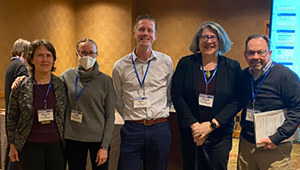Lorella Palazzo, PhD
Biography
Lorella Palazzo, PhD, is a sociologist who specializes in optimizing care delivery and improving access to health services. She has extensive experience in analyzing clinical data and evaluating health care improvement efforts. At Kaiser Permanente Washington Health Research Institute (KPWHRI), she has used this expertise to assess the progress and results of pilot projects supported by the Group Health Foundation Partnership for Innovation. In these projects, KPWHRI researchers and Kaiser Permanente Washington clinicians work together to test innovative health care improvement ideas. Dr. Palazzo's evaluations have determined how a pilot innovation affected health care costs, care delivery, and patient experiences. With the MacColl Center for Health Care Innovation, she also has evaluated efforts to reduce medical overuse. Dr. Palazzo has supported research at KPWHRI on aging and dementia, cancer, cardiovascular health, mental health, and safe medication use. She plans to continue and expand her recent work in implementation science and cancer screening. Inspired by her background as a sociologist, Dr. Palazzo is also interested in how social scientists can best collaborate with other health researchers to improve health care.
Dr. Palazzo’s previous work includes evaluating educational programs to make sure that nurses and medical assistants get up-to-date training that reflects current health care demands. She has studied the best ways to attract and retain nurses and other clinical personnel to underserved areas. She brings this experience to current research that particularly focuses on health disparities and matching the health workforce with the needs of rural residents and underrepresented minorities. Dr. Palazzo has also researched alternative modes of healing and how they are being integrated into health care delivery systems to expand care options for patients.
RESEARCH INTERESTS AND EXPERIENCE
-
Implementation science
Health information technologies; sustainability and diffusion of innovations; guideline implementation; organizational processes
-
Complementary & Integrative Health
Bringing evidence-based new approaches to clinical practice, exploring the sociocultural context for personal health tracking and behavior change
-
Cancer screening
Studying access to cancer screening; patient-, provider- and system-level determinants of screening; organization and outcomes of cancer screening services
-
Health Services & Economics
Assessing cost and effectiveness of quality improvement projects; using quantitative and qualitative methods to analyze delivery system innovations; optimizing the health care workforce
-
Evaluation Science
Using research methods to measure the effectiveness of health services and health professional training programs
-
Medical Sociology
Studying health care organizations and institutions; social factors in health, illness, and medical care; health care system access and health disparities
Recent publications
Vasavada A, Palazzo L, Luce C, Sanchez M, Triplette M, Ralston JD, Carter-Bawa L, Green BB, Gao H, Li CI, Anderson ML, Su YR, Rogers K, Wernli KJ "It's coming whether we want it to or not": A qualitative exploration of older adults' comfort with and perceptions of technology and digital health 2025 Nov 19 doi: 10.21203/rs.3.rs-8001649/v1. Epub 2025-11-19. PubMed
Martinez RG, Cramer ER, Norris LA, Matson A, Lang C, Henrikson NB, Blasi PR, Palazzo LG, Hoopes AJ, Dorsey S, Weiner BJ Short Report: Comparison of three methods for identifying implementation determinants to measurement-based care 2025 Nov 19 doi: 10.21203/rs.3.rs-7973723/v1. Epub 2025-11-19. PubMed
Louie T, Snidarich M, Hippe DS, Wernli KJ, Palazzo L, Hansell L, Brown M, Coronado GD, Lodhi S, Leone R, DeCell K, Mardesich K, Wysham N, Triplette M A pragmatic pre-post intervention trial to address adherence to lung cancer screening follow-up in community settings (the ACCELL trial): Study protocol 2025 Oct 10;159:108106. doi: 10.1016/j.cct.2025.108106. Epub 2025-10-10. PubMed
Wernli KJ, Anderson ML, Palazzo L, Luce C, Bezman N, Chin M, Gao H, Ralston JD, Rogers K, Su YR, Triplette M, Carter-Bawa L, Vasavada A, Jordan M, West M, Boler S, Green BB Effectiveness of health communication intervention to improve knowledge on timeliness to return for annual lung cancer screening: The Larch Trial 2025 Sep 10 doi: 10.1016/j.chest.2025.07.4111. Epub 2025-09-10. PubMed
Mogk J, Idu AE, Bobb JF, Key D, Wong ES, Palazzo L, Stefanik-Guizlo K, King D, Beatty T, Dorsey CN, Caldeiro RM, Garza McWethy A, Glass JE Prescription Digital Therapeutics for Substance Use Disorder in Primary Care: Mixed Methods Evaluation of a Pilot Implementation Study 2024 Sep 2;8:e59088. doi: 10.2196/59088. Epub 2024-09-02. PubMed
Research

Helping first-time screeners know when to return
Well-timed outreach in print and video can boost awareness of repeat screening for lung cancer, study finds.
HCSRN conference

Researchers present, connect at annual conference
The HCSRN conference is a venue for collaborative work to improve health and health care.
Free training

How to become a clinical value champion
KPWHRI’s ACT Center offers online training to help clinicians identify and curb overused services in clinical practice.

 Download photo
Download photo
